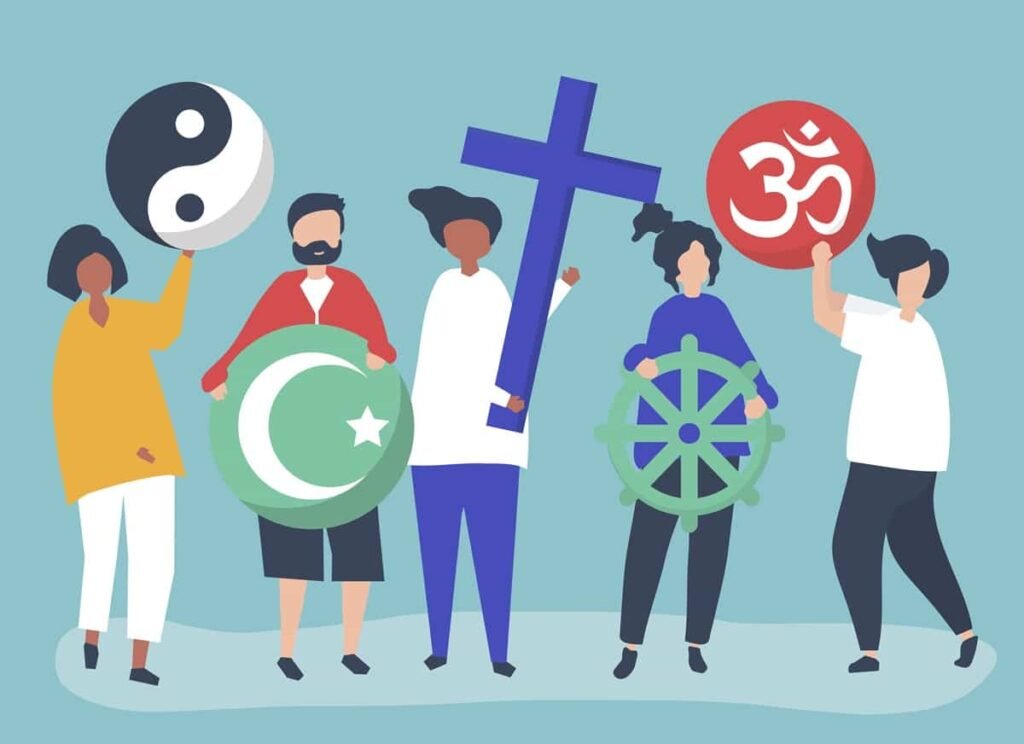What is Religion? The word “religion” is ubiquitous. We hear it in news reports, political debates, and everyday conversations. But what exactly is religion? Defining it proves to be a surprisingly complex and nuanced endeavor, sparking ongoing debate among scholars across disciplines like anthropology, sociology, philosophy, and theology. This blog post will explore the multifaceted nature of religion, examining its key components, the challenges of defining it universally, and some of the most influential theories surrounding its origins and functions.
What is Religion

The Elusive Definition of Religion
At its most basic, religion can be understood as a system of beliefs and practices centered around the sacred or supernatural. However, this simple definition quickly unravels when applied to the vast diversity of religious expressions throughout history and across cultures.
Consider these challenges:
- The Problem of the Supernatural: Many religions, particularly in the Abrahamic traditions (Judaism, Christianity, Islam), explicitly involve a belief in a divine being or beings, miracles, and an afterlife. However, some traditions, like certain forms of Buddhism, focus more on ethical conduct and self-cultivation without necessarily invoking a theistic deity. Are these traditions still considered religions?
- The Secularization Thesis: The secularization thesis, popular for much of the 20th century, argued that as societies modernize and become more rational, the influence of religion would inevitably decline. While religiosity has undoubtedly changed in many parts of the world, it hasn’t disappeared. Instead, it’s often reconfigured and re-expressed in new ways, blurring the lines between the religious and the secular. Think of secular humanist movements that often adopt the ethical frameworks and communal aspects found in traditional religions.
- Functional Equivalence: Some scholars argue that certain non-religious activities or ideologies can serve similar functions as religion, providing meaning, purpose, and a sense of belonging. Examples might include nationalism, environmentalism, or even fandoms. If these provide the same psychological and social benefits as religion, are they functionally equivalent and therefore should be included in a broader definition?
- The Etymology Trap: The word “religion” comes from the Latin “religare,” meaning “to bind” or “to reconnect.” This etymology suggests that religion is about binding people together or reconnecting them with something larger than themselves. However, focusing solely on the etymology can be limiting, as the meaning and application of the term have evolved considerably over time.
- Insider vs. Outsider Perspectives: How we define religion often depends on whether we’re an insider, practicing the religion, or an outsider, studying it from an academic perspective. An insider might focus on the truth claims and lived experiences of their faith, while an outsider might prioritize sociological or anthropological analyses.
Key Components of Religion
Despite the definitional challenges, certain elements are commonly associated with religion:
- Belief Systems: Religions often involve a set of beliefs about the nature of reality, the existence of God or gods, the origins of the universe, the meaning of life, and what happens after death. These beliefs may be codified in sacred texts, passed down through oral tradition, or interpreted through individual experience.
- Rituals and Practices: Religious practices are actions or behaviors that express faith, connect with the sacred, and reinforce the community. These can include prayer, meditation, worship services, pilgrimages, sacrifices, ceremonies marking life cycle events (birth, marriage, death), and ethical guidelines for behavior.
- Moral Codes: Most religions provide a framework for ethical conduct, defining what is considered right and wrong. These moral codes can be based on divine commandments, natural law, or social consensus. They guide believers in their relationships with God, with other people, and with the environment.
- Sacred Texts and Objects: Many religions have sacred texts that are considered authoritative sources of knowledge and wisdom. These texts may be believed to be divinely inspired or to contain profound insights into the nature of reality. Sacred objects, such as icons, relics, or symbols, can also hold religious significance and serve as focal points for devotion.
- Community: Religion often provides a sense of belonging and community for its members. Religious institutions, such as churches, temples, mosques, and synagogues, offer opportunities for social interaction, mutual support, and shared experiences.
- Emotional Experiences: Religious experience can encompass a wide range of emotions, including awe, wonder, reverence, fear, love, and joy. These experiences can be triggered by rituals, prayer, meditation, or encounters with the sacred.
- Sense of Purpose and Meaning: Perhaps the most fundamental function of religion is to provide a sense of purpose and meaning in life. It can offer explanations for suffering, death, and other existential challenges, and it can inspire people to live lives of compassion, service, and devotion.
Theories on the Origins and Functions of Religion
Numerous theories have been proposed to explain the origins and functions of religion. Here are a few influential examples:
- Edward Burnett Tylor and Animism: Tylor, a pioneering anthropologist, argued that religion originated in animism, the belief that all things, including inanimate objects, possess a spirit or soul. He believed that early humans developed animistic beliefs in an attempt to explain dreams, death, and other mysterious phenomena.
- Émile Durkheim and Social Cohesion: Durkheim, a foundational sociologist, emphasized the social functions of religion. He argued that religion serves to create social solidarity and reinforce shared values. Rituals, in particular, play a crucial role in uniting people and promoting collective consciousness.
- Karl Marx and the “Opiate of the Masses”: Marx viewed religion as a tool of social control, arguing that it served to justify inequality and oppression. He famously described religion as the “opiate of the masses,” suggesting that it provided a temporary escape from the harsh realities of life under capitalism but ultimately hindered social progress.
- Sigmund Freud and Psychological Needs: Freud, the founder of psychoanalysis, argued that religion originated in the unconscious needs and desires of individuals. He believed that religious beliefs, such as the belief in God, were projections of the paternal figure and that rituals served to alleviate anxiety and guilt.
- Mircea Eliade and the Sacred and Profane: Eliade, a historian of religions, focused on the distinction between the sacred and the profane. He argued that religion involves the experience of the sacred, which is set apart from the ordinary and mundane. Religious rituals and symbols serve to connect people with the sacred realm.
- Clifford Geertz and Symbolic Systems: Geertz, an influential anthropologist, viewed religion as a cultural system of symbols that provide meaning and order to the world. He argued that religious symbols shape people’s perceptions, emotions, and behaviors.
- Cognitive Science of Religion: This interdisciplinary field uses cognitive psychology and evolutionary biology to understand the cognitive mechanisms that underlie religious beliefs and behaviors. For example, some research suggests that humans are naturally inclined to see agency and purpose in the world, which may contribute to the development of religious beliefs.
The Ongoing Relevance of Religion
Despite predictions of its decline, religion continues to be a powerful force in the world today. It shapes political landscapes, influences social norms, and provides meaning and purpose for billions of people. Understanding religion is, therefore, crucial for navigating the complexities of the modern world.
Moreover, studying religion allows us to:
- Understand diverse cultures: Religion is deeply intertwined with culture, and understanding religious beliefs and practices is essential for understanding different cultures.
- Promote interfaith dialogue: In an increasingly interconnected world, interfaith dialogue is crucial for fostering understanding and cooperation between people of different faiths.
- Address social issues: Religion plays a role in many social issues, such as poverty, inequality, and environmental degradation. Understanding the religious dimensions of these issues is essential for developing effective solutions.
- Gain a deeper understanding of ourselves: Studying religion can help us to reflect on our values, beliefs, and assumptions about the world.
Conclusion
Defining religion is a complex and ongoing process. There is no single, universally accepted definition. However, by examining its key components, exploring different theories about its origins and functions, and considering its ongoing relevance in the modern world, we can gain a deeper appreciation for the multifaceted nature of religion. It is a powerful force that shapes individual lives, social structures, and the course of history. While its form may constantly evolve, its enduring quest for meaning, purpose, and connection remains a fundamental aspect of the human experience.


